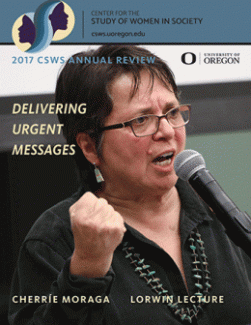Features:
- “A Year in Review: 2016-17,” by Michelle McKinley & Dena Frazier
- "The Work of the First Generation Writer: with Cherríe Moraga,” Interview by Alice Evans, Gabriela Martínez, and Dena Frazier
Faculty Research:
- “Oceanic Whispers, Stories She Never Told,” by Alaí Reyes-Santos, Department of Ethnic Studies
- “Gender, Ethnicity, and Citizenship: Female Burmese Workers in Chinese Border Cities,” by Xiaobo Su, Department of Geography
- “Did You Kill Your Baby? Gender, Race, and Religion in the Early Venezuelan Republic,” by Reuben Zahler, Department of History
- “A Pakistani Poet Lifts Her Voice Against Violent Extremism,” by Anita Weiss, Department of International Studies
Graduate Student Research:
- “Institutional Mother, Professional Caregiver,” by Yi Yu, Department of Geography
- “The Birth of an American Staple Fruit,” by Helen Yi-lun Huang, Department of English
- “Understanding Women’s Agency in Rural Punjab, Pakistan,” by Sarah Ahmed, Department of Sociology
- “Developing Style: How the Washington Post Discovered Women’s Issues,” by Thomas Schmidt, PhD, Research Fellow, Wayne Morse Center
- “Listening as Learning: Reflections on an Ethnography of Gender in Quinhagak, Alaska,” by Anna Sloan, Department of Anthropology
- “Beyond Bonds of Blood: Queer Families and the Limits of the Marriage Equality Movement,” by Kenneth Surles, Department of History
- “Placing Mexico on the Map: Rosario Castellanos and Global Feminist Literature,” by Erin Gallo, Department of Romance Languages
- “Gender, Land, and Food Sovereignty in Nicaragua,” by Rachel Mallinga, Department of Public Policy, Planning & Management
Highlights from the Academic Year:
- “Ayana Mathis and The Twelve Tribes of Hattie,” Panelist commentary by Sharon Luk, Department of English
- News & Update
- Looking at Books
- Remembering Sandra Morgen
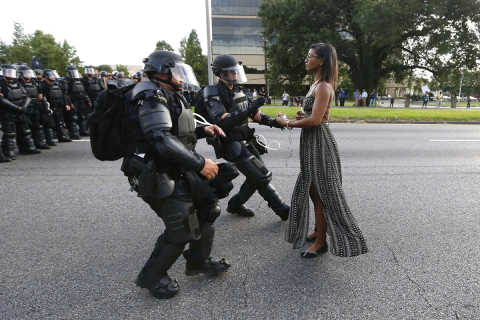
A Year in Review: 2016–17
by Michelle McKinley, Director, CSWS, and Dena Zaldúa Frazier, Operations Manager, CSWS
What a year…in many ways for CSWS and for the UO campus community as a whole, this past year was the best of times and the worst of times.
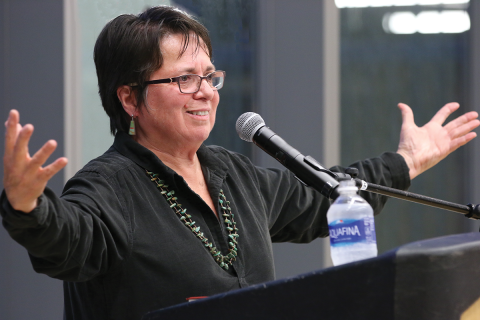
The Work of the First Generation Writer: A Conversation with Cherríe Moraga
Interviewed by Alice Evans, CSWS Managing Editor; Gabriela Martínez, Associate Professor, School of Journalism and Communication; and Dena Zaldúa Frazier, CSWS Operations Manager

Oceanic Whispers, Stories She Never Told: Chronicles at the Edge of Empire
“Nadie sabe lo que existe en la profundidad del mar.” — Cuban-Lukumí proverb
By Alaí Reyes-Santos, Associate Professor, Department of Ethnic Studies

Gender, Ethnicity, and Citizenship: Female Burmese Workers in Chinese Border Cities
by Xiaobo Su, Associate Professor, Department of Geography
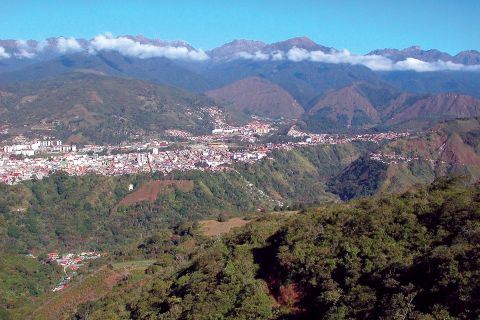
Did You Kill Your Baby?: Gender, Race, and Religion in the Early Venezuelan Republic
by Reuben Zahler, Associate Professor, Department of History
In January of 1811, María Isabel Ribas found herself in jail, charged with murdering her own baby, one of the most heinous acts imaginable for a Catholic woman. A few days earlier, in her neighborhood of Mérida, Venezuela, locals had found the cadaver of a newborn infant in a field, being eaten by vultures. Officials searched in the area for women who had recently been pregnant, and questioned María. She admitted that the baby was hers but also insisted that she was innocent of murder.
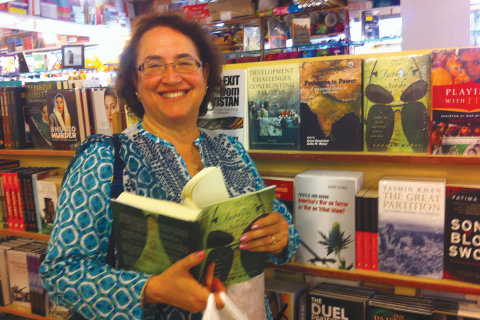
Hasina Gul: A Pakistani Poet Lifts Her Voice Against Violent Extremism
by Anita Weiss, Professor, Department of International Studies

Institutional Mother, Professional Caregiver: Biopolitics of Affective Labor in Chinese State-Owned Social Welfare Institutions
By Yi Yu, PhD candidate, Department of Geography

The Birth of an American Staple Fruit: Reading Bananas from Cookbooks
by Helen Yi-lun Huang, Graduate Student, Department of English
“Yes, we have no bananas
We have-a no bananas today.”

Understanding Women’s Agency in Rural Punjab, Pakistan
by Sarah Ahmed, PhD candidate, Department of Sociology
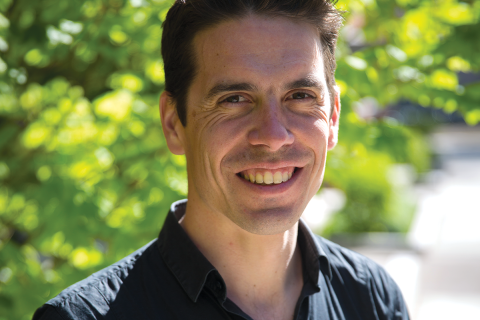
Developing Style: How The Washington Post Discovered Women’s Issues
by Thomas R. Schmidt, PhD, Research Fellow, Wayne Morse Center for Law and Politics
In 1969, the Washington Post was the first major American newspaper to replace its women’s pages with a lifestyle section. Introducing the Style section was one of the most lasting legacies of famed Post editor Ben Bradlee. As he later described the launch of Style, “We wanted to look at the culture of America as it was changing in front of our eyes. The sexual revolution, the drug culture, the women’s movement. And we wanted to be interesting, exciting, different.”1
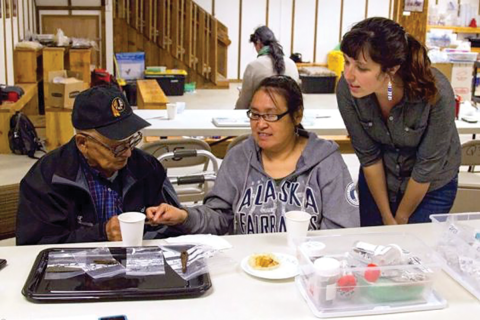
Listening as Learning: Reflections on an Ethnography of Gender in Quinhagak, Alaska
by Anna Sloan, PhD candidate, Department of Anthropology

Placing Mexico on the Map: Rosario Castellanos and Global Feminist Literature
by Erin Gallo, PhD candidate, Department of Romance Languages

Gender, Land, and Food Sovereignty in Nicaragua
by Rachel Mallinga, Master’s Candidate, Department of Public Policy, Planning, and Management
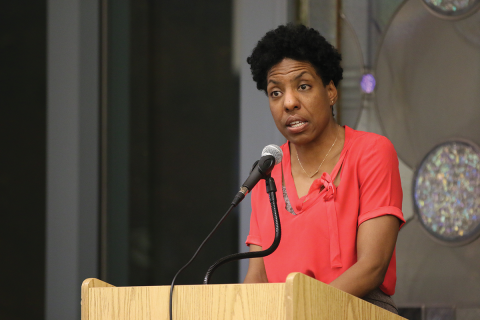
The Twelve Tribes of Hattie: Panelist Commentary
by Sharon Luk, Assistant Professor, UO Department of English
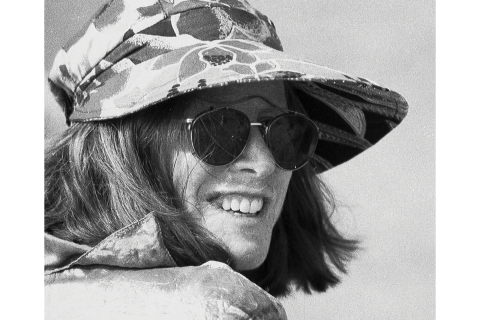
Remembering Sandra Morgen
March 31, 1950 – September 27, 2016
Friends and colleagues held a memorial service for Sandra Morgen in November 2016 at the Ford Alumni Center Giustina Ballroom on the UO campus. Remembrances are recorded on the CSWS website at: csws.uoregon.edu/about/history/sandra-morgen/


